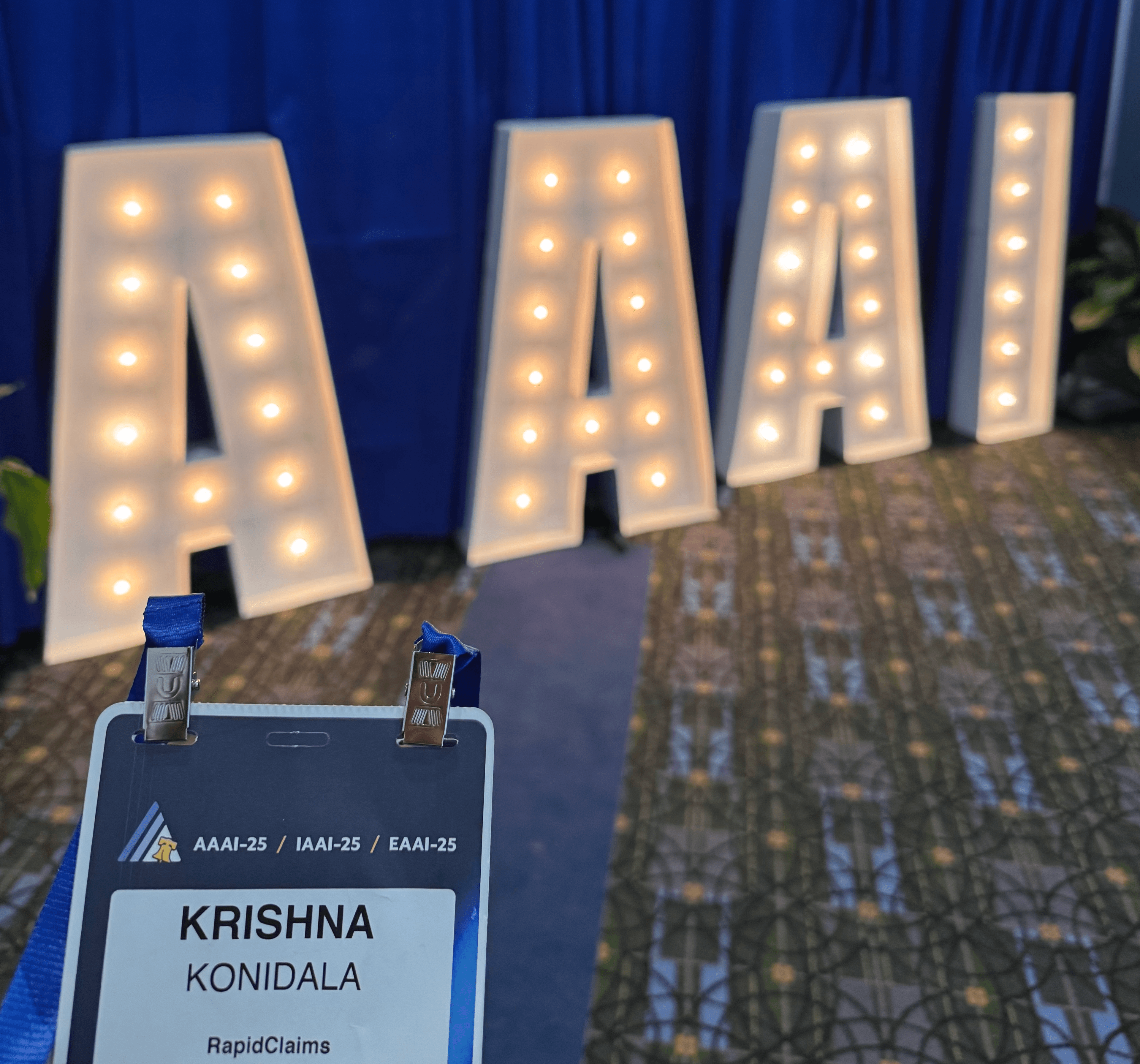- Published on
The AI Landscape: Takeaways from AAAI 2025
- Authors

- Name
- Krishna Konidala
RapidClaims recently participated in the Association for the Advancement of Artificial Intelligence (AAAI) 2025 conference, a leading global event showcasing the latest breakthroughs in AI and ML. From advancements in efficient inference to transformative applications in healthcare, the conference provided a comprehensive look at AI’s evolving landscape. Krishna Konidala, VP of Engineering at RapidClaims, shares his key insights below.
AI in Healthcare
Practical and Patient-Centric AI: On improving clinical workflow efficiency, Collaborative Multimodal Pretraining techniques effectively address the issue of data scarcity in specialized medical domains and studies on AI-generated radiology draft reports demonstrated measurable improvements in both accuracy and turnaround time for radiologists. Such AI drafting is expanding beyond radiology to other complex medical cases, such as pathology reports to help pathologists draft comprehensive analyses with greater detail. On patient experience, presentations include work like ReXplain, which transforms technical radiology findings into accessible video explanations that patients can actually understand.
Clinical Intelligence Systems: Use of multi-view contrastive learning that enhances medical domain adaptation and a multi-agent LLM framework designed to improve clinical question-answering for more accurate and efficient medical insights were some of the highlights.
An Engineering Perspective
Model Efficiency Innovations: Advances in KV caching and model compression techniques that drastically reduce computational requirements. The MagicPIG approach of LSH Sampling addresses performance and resource demands. Knowledge distillation techniques have also matured, with many presenting methods that successfully transfer capabilities from massive models to deployable, lightweight versions without significant quality loss.
Context Window Expansion: Synthetic Continued Pre-training enhances RAG particularly for specialized domains. On the practical side, techniques like query rewriting and efficient prompt tuning showed how simple interventions can dramatically improve response quality. On the explainability front, LLM Attributor offered a framework for understanding how models arrive at their conclusions.
Secure AI Driven Code Tools: Security took center stage in coding applications, with presentations on Adaptive Program Repair featuring sophisticated bug localization techniques. Researchers demonstrated approaches specifically designed to address CVEs and security vulnerabilities in AI-generated code. Beyond individual models, a recurring theme was the integration of lightweight red teaming into Agentic Workflows, creating multi-layered security that complements foundation models' built-in guardrails — essential for enterprise deployments where risk tolerance is minimal.
Shift in Data Gravity: A fundamental shift is occurring in how we think about AI infrastructure - with gen AI making computation more expensive than data transfer — the reverse of historical patterns — traditional cloud architectures face new scrutiny. Some presentations explored this "reversed data gravity" demonstrating novel approaches to intelligently distribute workloads across cloud, edge, and hybrid environments for optimal performance and cost.
Tooling Ecosystem: The demo hall showcased some soon-to-be open-sourced tools like the QGen Studio that addresses the need for high-quality synthetic data and robust evaluation, Agent Trajectory Explorer that offers visibility into agent decision paths, making debugging more intuitive. Security-focused applications included CyberPal, which augments models with expert security knowledge.
Final Thoughts
AAAI 2025 showcased rapid advancements in AI efficiency, explainability, security, and real-world applications — from enhancing LLMs/SLMs and long-context processing to AI-driven development and cybersecurity tools. These innovations are not just academic; they are actively shaping the next generation of intelligent, interpretable, and robust systems. At RapidClaims, we are excited about integrating these advancements into real-world applications that enhance efficiency and drive meaningful impact.
If you're passionate about AI and applied research, now is an exciting time to join us at RapidClaims! Feel free to connect and Let’s explore the future together. 🚀
